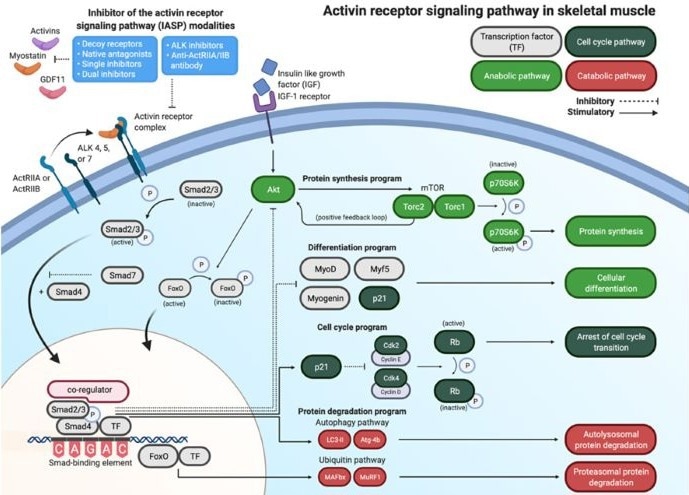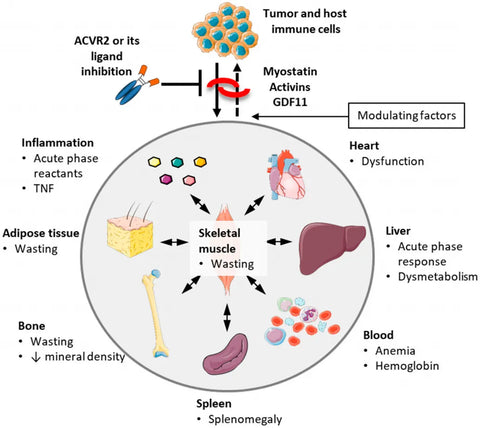"Obesity is gradually eroding human health," and the global prevalence of obesity (BMI > 30) is predicted to reach 25 % by 2035, affecting nearly 1.9 billion people. The demand for medications to prevent and cure obesity-related disorders is also increasing as the population becomes more obese.
In reaction to the "new normal" of obesity, numerous corporations, including Pfizer, Novartis, and Eli Lilly, are expanding their R&D efforts to seek more effective remedies to the obesity issue.

Global obesity prevalence rate. Image Credit: world obesity atlas 2023
GLP-1 related drugs boom, pain points urgent
Wegovy® is the first FDA-approved weight-management medicine designed to imitate glucagon-like peptide-1 (GLP-1), a hormone that targets brain areas important for hunger and food intake regulation. Its approval represents a significant milestone in the rapidly expanding GLP-1 anti-obesity medicine market.

Figure of Wegovy®. Image Credit: ACROBiosystems
Despite this rapid growth, GLP-1 weight loss medications present critical challenges that demand immediate attention: long-term usage of GLP-1 therapies may result in muscle loss.
In response, the industry has begun a new round of layout in the obesity treatment sector, with several pharmaceutical companies focusing on other new therapeutic targets, such as the Activin receptor Activin R, in the hopes of developing innovative therapies that can effectively reduce weight while protecting muscles.
The emerging target for fat loss and muscle gain: Activin R
Activin, part of the TGF-β superfamily, regulates cell proliferation, differentiation, and death. In muscle tissue, Activin interacts with the Activin RII receptor, triggering intracellular signaling pathways.
Activin RII phosphorylates Activin RI, which activates the Smad2/3 signaling pathway. The activated Smad2/3 transcription factors reach the nucleus and control the production of genes involved in muscle protein metabolism.
These genes encode proteins that limit protein synthesis and activate protein breakdown, ultimately leading to muscular atrophy. As a result, blocking the Activin signaling pathway may produce effective fat loss.

The signaling pathway of Activin. Image Credit: ACROBiosystems
The development of medications that target Activin R opens new therapeutic options for the treatment of sarcopenia, metabolic disorders, and other illnesses. Bimagrumab, LAE102, and Garetosmab are three monoclonal antibody medicines that target Activin.
- Bimagrumab, developed by Novartis, is a high-affinity antibody that targets Activin RIIB, effectively blocking the Activin signaling pathway to promote muscle growth. Research by Nunn indicates that during semaglutide treatment, Bimagrumab can help preserve lean body mass while enhancing fat mass reduction. This preservation of lean body mass is linked to improved metabolic and functional outcomes.
- On June 26th, 2024, Laekna, Inc announced that the Phase I clinical trial of LAE102 (a monoclonal antibody against Activin RIIA) for the treatment of overweight/obesity in China was successfully completed at Zhongshan Hospital, Fudan University, Shanghai.
- Garetosmab, developed by Regeneron Pharmaceuticals, is a fully human IgG4 monoclonal antibody that primarily targets Activin A, which is associated with muscle growth. Unlike Bimagrumab and LAE102, Garetosmab focuses specifically on this pathway. Trials combining Garetosmab with semaglutide, scheduled to begin in May, aim to investigate strategies for improving the quality of weight loss and preventing weight regain after treatment cessation. As of yet, no updates on the progress of these trials have been disclosed.
As Activin R-targeting medicines gain clinical traction, they have the potential to be the key to overcoming the existing drawbacks of GLP-1-based weight reduction therapies.
New Activin R-based medications can emerge as perfect solutions for balancing weight loss and muscle building, making a significant contribution to the future obesity treatment industry.
ACROBiosystems offers a line of Activin receptor proteins with strong biological activity proven by ELISA and affinity confirmed by SPR&BLI. These proteins are widely applicable in Activin-related pathway research and targeted therapy development, allowing for the investigation of the regulatory mechanisms of Activin pathways in obesity and muscle metabolism.
Activin family: An emerging target for disease treatment
Aside from obesity, members of the Activin family, such as Activin A and Activin B, have shown significant therapeutic potential in a variety of other diseases, including liver fibrosis, renal diseases, neurological disorders, and immunological diseases.

Diseases associated with Activin signaling pathways. Image Credit: ACROBiosystems
ACROBiosystems offers a wide selection of Activin family proteins, including Premium-grade Activin products for cell culture, which fuels the ongoing search for novel therapeutic treatments.
- Cytokine targets for developing therapeutics

Image Credit: ACROBiosystems
- Growth factors for cell culture

Image Credit: ACROBiosystems
References
- Nunn, E., et al. (2024). Antibody blockade of activin type II receptors preserves skeletal muscle mass and enhances fat loss during GLP-1 receptor agonism. Molecular Metabolism, (online) 80, p.101880. https://doi.org/10.1016/j.molmet.2024.101880.
- Wang, Y., et al. (2024). Garetosmab in Fibrodysplasia Ossificans Progressiva: Clinical Pharmacology Results from the Phase 2 LUMINA-1 Trial. Journal of clinical pharmacology, (online) 64(2), pp.264–274. https://doi.org/10.1002/jcph.2344.
- Zhang Y. (2024). Fat loss and muscle gain: targeting the Activin signaling pathway . https://kactusbio.com/blogs/news/fat-loss-and-muscle-gain-targeting-the-activin-signaling-pathway?srsltid=AfmBOopPH4ZkMSA5W2r1PmCkAmkOBYBm3ICJ6TLlzfYpdQOfzb5XkZcl.
- Lodberg, A. (2021). Principles of the activin receptor signaling pathway and its inhibition. Cytokine & Growth Factor Reviews, (online) 60, pp.1–17. https://doi.org/10.1016/j.cytogfr.2021.04.001.
- World Obesity Atlas (2023). World Obesity Atlas 2023. (online) World Obesity Federation. Available at: https://www.worldobesity.org/resources/resource-library/world-obesity-atlas-2023.
About ACROBiosystems
ACROBiosystems is a cornerstone enterprise of the pharmaceutical and biotechnology industries. Their mission is to help overcome challenges with innovative tools and solutions from discovery to the clinic. They supply life science tools designed to be used in discovery research and scalable to the clinical phase and beyond. By consistently adapting to new regulatory challenges and guidelines, ACROBiosystems delivers solutions, whether it comes through recombinant proteins, antibodies, assay kits, GMP-grade reagents, or custom services. ACROBiosystems empower scientists and engineers dedicated towards innovation to simplify and accelerate the development of new, better, and more affordable medicine.
Sponsored Content Policy: News-Medical.net publishes articles and related content that may be derived from sources where we have existing commercial relationships, provided such content adds value to the core editorial ethos of News-Medical.Net which is to educate and inform site visitors interested in medical research, science, medical devices and treatments.